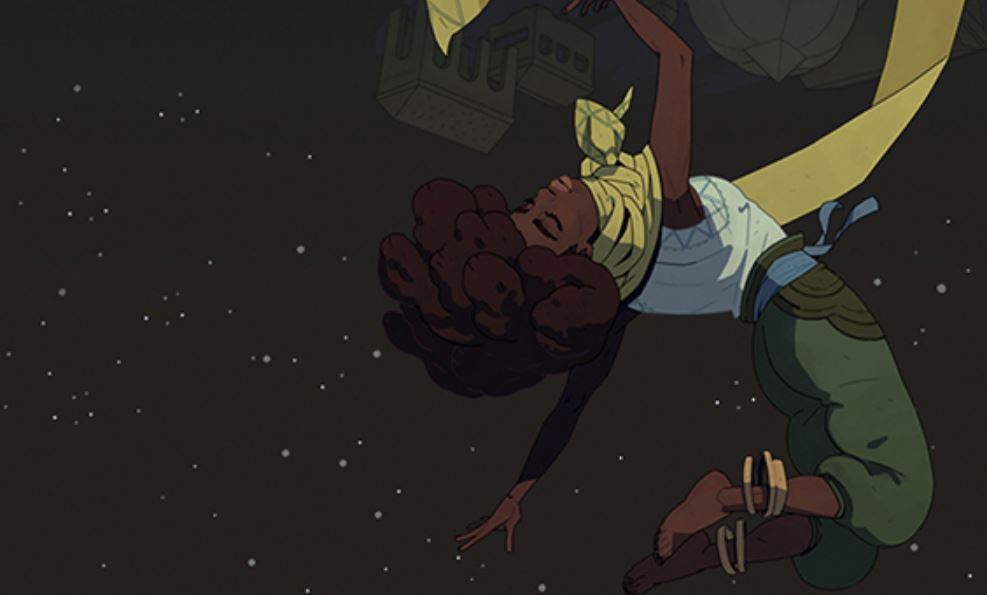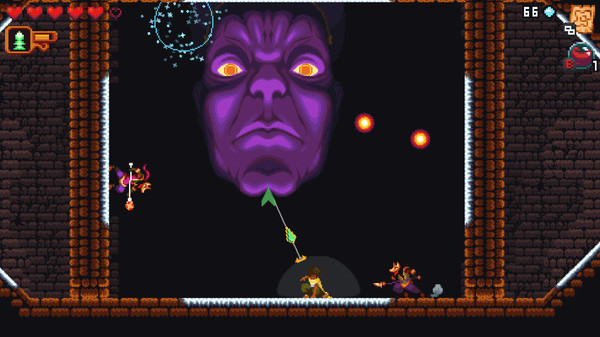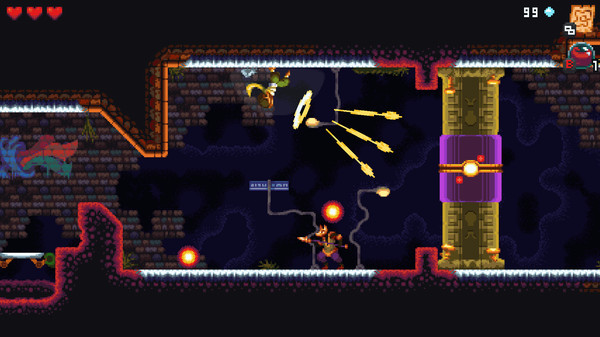Developer: Long Hat House
Publisher: Raw Fury
Platform(s): PS4, Switch, Xbox One, PC
Review code provided
There’s something about punishing difficulty that draws me in despite my tendency to hurl a swear or two at my monitor. Games such as Bloodborne are upfront about their difficulty and are in fact revered for it, rather than vilified for their rage-inducing gameplay. A genre that embraces similar fanfare for their difficulty is the Metroidvania. Inspired by Metroid Prime or Castlevania, these games feature sprawling interconnected world maps, though access to parts of the world is usually limited by doors or other obstacles that can only be passed once the player has acquired unique weapons or abilities. Significant emphasis is placed on player’s reflexes and their item management to overcome these challenges.
While there have been exceptional games channeling the Metroid and Castlevania ethos for years, few games have evolved the genre.
That is, until Dandara.
Developed by Long Hat House, Dandara is a twist on the 16-bit era 2D Metroidvania games that promises to abide by many of the genre conventions that players expect while presenting them in a revolutionary way. The player is in control of resistance fighter Dandara, whose home, a dreamlike world known as the Salt, is under attack by ruthless and diverse forces of evil. Dandara must travel through the Salt, encountering a litany of enemies and discovering powerful abilities to overcome these evil forces to save her home.
Typically, players would run and double jump their way through environments, but in Dandara the player’s movement is of a more gravity-defying nature. Dandara’s movement is restricted to platforms on both the walls and ceilings, platforms onto which Dandara can leap to and fro. A strange predicament for a platformer, but ultimately its implementation is so flawless that it simply works. The game’s handling of jumping between walls and ceilings to reach doors or to evade enemy projectiles is implemented so fluidly that it doesn’t take long to become accustomed to this unique means of traversing Dandara’s world.
This traversal adds a sense of urgency, making it imperative to approach each combat scenario methodically. Enemies are plentiful and hit hard, requiring the player to quickly leap across rooms to avoid projectiles and environmental hazards that stand in their way.
I found that the speed at which Dandara can move through environments alleviated the age-old Metroidvania problem of tedious backtracking through previously explored areas. Considering the amount of backtracking required for these types of games, this was immensely helpful.
This sense of movement and speed is integral to every aspect of Dandara’s gameplay and bolsters the overall experience. Boss fights have always been a highlight of Metroidvania inspired games, whether in the creative ways to fight bosses or their sheer difficulty. Again, Dandara shines by delivering boss fights while integrating its movement and gravity shifting that make these a memorable challenge of reflexes and patience. Dandara’s use of gravity and movement are intrinsic to gameplay, and the fluidity of its implementation adds another level of identity and differentiates it from any other Metroidvania game. Ever.
Movement aside, Dandara follows relatively standard Metroidvania gameplay conventions for exploring areas and finding abilities that allow progress to previously restricted areas of the map. But it’s the game’s, at times, punishing difficulty that elevates Dandara above other challenging Metroidvania titles.
Simply put, Dandara is hard as hell.
Be prepared to die numerous deaths. Dandara has not only a hardcore Bloodborne level of difficulty spikes from zone-to-zone but has little in the way of handholding. Dandara is the embodiment of learning to play through experimentation as several areas require multiple attempts. The player must become accustomed to observing and memorizing enemy attack patterns and projectile paths if they wish to survive for more than a couple of minutes. Some areas I even found more challenging than one or two of the game’s several boss fights, given the number of projectiles and enemies I had to contend with simultaneously.
Timing is everything in Dandara, from jumping to a platform to avoid an enemy’s projectile or even just timing a health potion just right, the player’s success is reliant on their ability to adapt. It’s challenging but rewarding, as there were several times when I only cleared a room by the skin of my teeth following several previous failed attempts. While Dandara encourages experimentation, its handling of death is less graceful.
Upon dying, the player respawns at the last campsite visited, which serve as upgrade stations. Upgrades such as increasing Dandara’s health and energy capacity, as well as the effectiveness of potions, is vital to overcoming the more difficult portions of the game, e.g., all of them. Upgrades cost pleas of salt, which the player accrues from defeating enemies, and this currency is tied to the player’s current life. So if they die, to reclaim these funds the player must travel back to the area in which they died and recover the soul they left behind. It’s nice to have the option of recovering this lost currency, but remembering exactly where the player last died can be difficult.
The game does not indicate the room in which the player perished, which, given the maps expansiveness and gravity-bending nature, can make remembering exactly where the player died troublesome. I understand the hardcore nature of Dandara and applaud it (most of the time), but given the essential nature of upgrades that currency is spent on, the inclusion of a death marker would be much appreciated.
Dandara is a treat from start to finish. Despite finding the story relatively bare-bones over the seven hours it took me to complete it, what Dandara lacks in narrative, it makes up for in gameplay. These are the most memorable and innovative mechanics introduced into a Metroidvania game in years. Punishingly challenging at times, yet perfectly encapsulating the Metroidvania style of gameplay while expanding on it. This revolutionary injection of speed and urgency makes this a must play for Metroidvania fans and those looking for a challenge.
Some of the coverage you find on Cultured Vultures contains affiliate links, which provide us with small commissions based on purchases made from visiting our site.




